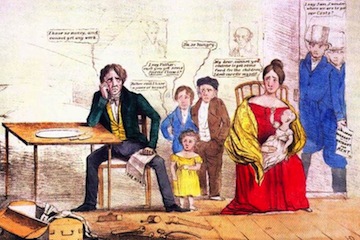Martin Van Buren and the Panic of 1837
 A Democratic family faces eviction from their home while the portraits of Andrew Jackson and Martin Van Buren hang on the wall, in this mocking Whig cartoon. (click for source)
A Democratic family faces eviction from their home while the portraits of Andrew Jackson and Martin Van Buren hang on the wall, in this mocking Whig cartoon. (click for source)
Martin Van Buren worked behind the scenes for many years as a founder and organizer of the Democratic Party. He served as Secretary of State and Vice President to Andrew Jackson and won election to the Presidency in his own right in 1836. This should have been the culmination of a successful career, but instead the Panic of 1837 ruined Van Buren and sent him crashing to political defeat. While the policies that caused this Panic were just as much the policies of Andrew Jackson, it was Van Buren who took the brunt of the blame and criticism.
Andrew Jackson was convincingly elected to the Presidency in 1828 and 1832 and rode a vast wave of popular enthusiasm. His was a personal following that could overlook some differences in policy opinion, for behind it all was the faith that Jackson was a sincere, unapologetic leader of the common man. Yet there were two key decisions he made as President which would have repercussions for Van Buren. One was his decision to end the Second Bank of the United States (in an episode known as the Bank War), and the other was his Specie Circular pronouncement which forced investors to buy government (mostly frontier) land with gold or silver.
For 20 years the Second Bank of the United States served as the national bank of the country and provided a currency and a degree of banking regulation. Most Democrats opposed the bank. It was a conservative, elitist institution and favored the established banks and depositors of the Northeast over the upstart South and West. In the name of stability (critics said to eliminate its competition), the Bank also imposed rules to regulate the size and lending of other non-national banks. As the Bank faded from the picture, many smaller banks made questionable loans and issued notes without any expertise or gold to back their actions. Real estate prices exploded upwards, speculators flourished, and many fraudulent bankers became rich. Meanwhile, the U.S. government was stuck with a large amount of depreciating paper money, and was effectively subsidizing a few (rather sleazy) land speculators at the expense of the public finances.
This situation angered Andrew Jackson as much as the imperiousness of the Second National Bank itself. Shortly before leaving office he issued the Specie Circular. This executive order required payment for government land to be in gold or silver. Since many speculators had been inflating the value of American land with worthless paper money, issued by unqualified banks, this new requirement had a devastating effect on land prices. When the paper money was removed, prices fell drastically, and almost half of the banks in the United States failed. Savings vanished, farms and plantations were lost, and the country languished in depression and unemployment for years.
This was the Panic of 1837. It happened shortly after Andrew Jackson left office. It coincided so well with the term of Martin Van Buren that all of the anger of the nation focused itself on him. Supporters became lukewarm and opponents branded him "Martin Van Ruin". While Jackson was a man of simple habits that endeared him to the people, Van Buren was ridiculed for his tastes and refinement. He was known to dress very expensively for the times, and to put on lavish White House banquets for visiting dignitaries. All of this put him of step with the prevailing mood of the public.
In much the same way that George H.W. Bush could not live up to the legacy of Ronald Reagan 150 years later, Martin Van Buren could never enjoy the popularity that had found Andrew Jackson. While a few have argued that Jackson's policies were beneficial in the long-term, they had severe short-term effects. However, it was Van Buren's reputation that suffered for them. How much of this is fair? Perhaps not all of it. However, Van Buren was very close to Jackson politically, and no doubt supported the measures listed above as fervently as Jackson did. He repeatedly declined to repeal the Specie Circular as President, though under constant pressure from the Whig Party to do so.
Though the Whigs were most definitely a party of the prosperous class, they were able to portray their candidate of 1840 as a common man of the frontier. William Henry Harrison was sold to the public as a simple, hard-living General and a man of the people. In this way, the Whigs stole a page from Andrew Jackson's political playbook and used it to soundly defeat Jackson's heir apparent in the 1840 Presidential election.